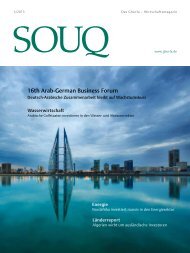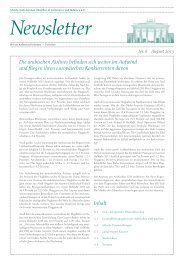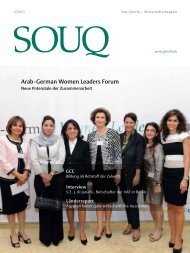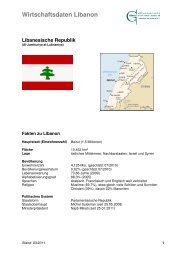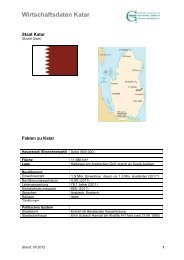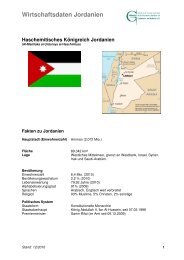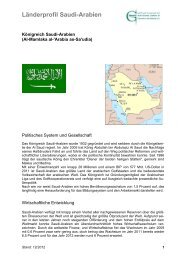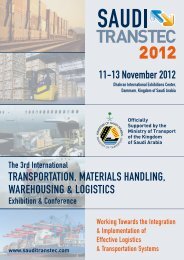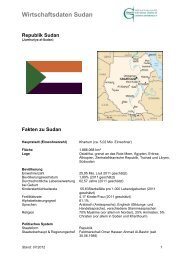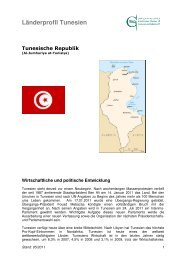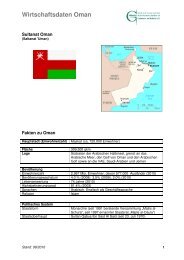Saudi-Arabien Wirtschaftshandbuch Saudi Arabia Business ... - Ghorfa
Saudi-Arabien Wirtschaftshandbuch Saudi Arabia Business ... - Ghorfa
Saudi-Arabien Wirtschaftshandbuch Saudi Arabia Business ... - Ghorfa
Sie wollen auch ein ePaper? Erhöhen Sie die Reichweite Ihrer Titel.
YUMPU macht aus Druck-PDFs automatisch weboptimierte ePaper, die Google liebt.
54<br />
Bereichen der Wasserverteilung, der Aufbereitung von<br />
Abwasser und seiner erneuten Nutzung sowie des Baus<br />
von Wasserentsalzungsanlagen sind inzwischen auch<br />
Investitionen des Privatsektors möglich.<br />
In den letzten Jahren erfolgte eine massive Steigerung<br />
der Meerwasserentsalzung bis zu dem Punkt, dass<br />
<strong>Saudi</strong>-<strong>Arabien</strong> weltweit der größte Erzeuger von entsalzendem<br />
Meerwasser ist. Gegenwärtig befinden sich<br />
30 Anlagen in Betrieb, die 3,4 Mio. Kubikmeter pro<br />
Tag produzieren. Bis zum Jahr 2025 soll diese Menge<br />
auf 10 Mio. Kubikmeter erhöht werden. Der Investitionsbedarf<br />
wird auf 23 Mrd. US$ geschätzt. Kurzfristig<br />
plant die staatliche Saline Water Conversion Corporation<br />
(SWCC) die Errichtung von drei kleineren Entsalzungsanlagen<br />
an der Küste des Roten Meeres und eine<br />
weitere Entsalzungsanlage an der Ostküste des Landes<br />
bei Al-Khafil. Wie auch im Energiebereich setzt der<br />
Staat in der Meerwasserentsalzung auf die Beteiligung<br />
privater Investoren. Das dazu gehörige Versorgungsnetz<br />
wird stetig erweitert. Die Länge der Versorgungsleitungen<br />
beträgt mittlerweile 4.170 km und die Anzahl<br />
der Pumpstationen 30. Mehr als 50% des kommunalen<br />
Wasserverbrauches werden gegenwärtig durch entsalztes<br />
Meerwasser gedeckt.<br />
In der Abwasseraufbereitung sind einige Fortschritte<br />
zu verzeichnen. Diese beschränken sich jedoch auf die<br />
großen Städte Riyadh und Jeddah. In der nahen Zukunft<br />
soll das Abwasseraufbereitungssystem der Hauptstadt<br />
ausgebaut werden. Um das gesamte Abwassersystem des<br />
Königreichs auszubauen und zu modernisieren, müssen<br />
schätzungsweise 20 Mrd. US$ investiert werden.<br />
–––––––––––––––––––––––––––––––<br />
enerGy And wAter<br />
The rapid economic development of the country has necessitated<br />
the development of a stable energy and water<br />
supply. The need for energy and water has risen constantly<br />
due to the growth in the population and the growing<br />
industrial capacities. By 2009, this sector will have<br />
an annual average growth rate of 4.2% and will make up<br />
around 1.5% of the GDP.<br />
The expansion of the energy generation capacities has<br />
always been a primary feature of the politico-economic<br />
decisions made by the <strong>Saudi</strong> government. In recent years,<br />
the energy capacities of the power plants have grown from<br />
20,647 MW (1999) to 30,651 MW (2006). Around<br />
48% of the capacities are made up by the power generated<br />
by gas turbines and diesel generators, whilst steam<br />
turbines produce around 34% of the power. Around 9%<br />
of the capacities are generated by the water desalination<br />
plants. The high percentage of the capacity generated<br />
by the gas turbines and diesel generators is primarily<br />
due to the existence of small independent networks far<br />
away from built-up areas and the lack of cooling water<br />
that is required for steam turbine power plants. However<br />
the percentage of the steam turbine power plants in the<br />
power supply system will increase with the expansion of<br />
the power supply network between and in the individual<br />
regions of the country and its ever growing connection<br />
to the networks of the neighbouring states. The main<br />
power consumers are the households with around 53%<br />
followed by industry (20%), the state sector (11%), the<br />
trade sector (10%) and the agricultural sector (2%).<br />
In recent years, there have been concerted efforts to restructure<br />
the electricity industry. In 2000, five regional<br />
power suppliers were merged to form the <strong>Saudi</strong> Electricity<br />
Company (SEC) as the umbrella organisation for all<br />
public power generators and suppliers. This organisation<br />
is responsible for the electricity supply, from its generation<br />
through to its distribution and customer service.<br />
There are plans to privatise some areas however these<br />
plans are still in their infancy. Also, the Electricity Service<br />
Regulatory Authority was founded in 2001 for more<br />
effective regulation and control of the electricity industry.<br />
Another impressive fact is that in 2002, the private<br />
National Energy Company took the initiative of developing<br />
the first steam turbine power plant with a capacity<br />
240 MW in the industrial town of Jubail. Furthermore,<br />
in 2004 a contract was concluded between ARAMCO<br />
and a private company for the construction of four power<br />
plants with a total capacity of 1,074 MW.<br />
The current development plan specifies that the power<br />
supply throughout the country will be completely secured<br />
by 2009. To this end, the power plant capacities will be<br />
raised to 38,017 MW, an increase of 40% compared to<br />
2004. Also, the capacities of the water desalination plants<br />
will be expanded from 3,426 MW to 4,721 MW. The aim<br />
is to ensure that the new capacities are predominantly<br />
created by private investors in the shape of BOO-projects<br />
(“build-operate-own”). There are also plans to connect<br />
the national electricity network with those of the GCC<br />
states by 2009.<br />
With regard to the pro capita water consumption, the<br />
Kingdom takes third place in the world with 286 litres a<br />
day. In light of the very dry climate in <strong>Saudi</strong> <strong>Arabia</strong>, spe-



